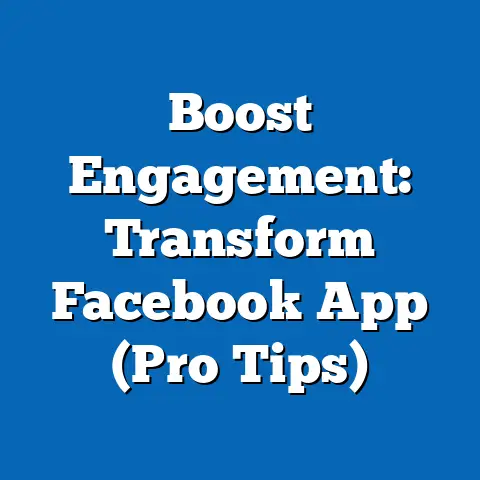Certifying Facebook Account for Political Ads (Essential Guide)
Section 1: Understanding Political Ads on Facebook
Political advertising on Facebook is a complex beast, encompassing more than just promoting a candidate.
It’s crucial to understand exactly what Facebook considers “political” to ensure you’re always operating within the platform’s guidelines.
Generally, a political ad on Facebook is any advertisement that:
- Refers to a clearly identified candidate: This is the most obvious category, encompassing ads that directly support or oppose a specific person running for office.
- Discusses a specific election or referendum: Ads related to voting dates, voter registration, or specific ballot measures fall under this umbrella.
- Addresses national legislative themes of public importance: This is where it gets a bit broader.
Ads discussing topics like healthcare, climate change, immigration, or gun control can be considered political if they’re framed in a way that influences public opinion or advocates for a particular policy position.
Think of it this way: if your ad could reasonably be interpreted as trying to sway public opinion on a political issue or candidate, it’s likely to be classified as political by Facebook.
The Significance of Political Ads on Facebook:
Facebook has become a central battleground for political discourse.
With billions of users worldwide, the platform offers unparalleled reach and targeting capabilities.
Political campaigns leverage Facebook to:
- Reach specific demographics: Facebook’s detailed targeting options allow campaigns to reach voters based on age, location, interests, and even political affiliations.
- Mobilize supporters: Ads can be used to encourage voter registration, promote campaign events, and solicit donations.
- Shape public opinion: Political ads can be used to frame issues, attack opponents, and influence the narrative surrounding a campaign.
Legal and Ethical Considerations:
Given the potential impact of political ads, they are subject to a variety of legal and ethical regulations.
These regulations vary by country and region, but some common themes include:
- Disclosure requirements: Many jurisdictions require political ads to clearly identify the source of funding and the entity responsible for the ad.
- Truth in advertising laws: While often difficult to enforce in the political arena, these laws aim to prevent false or misleading claims in political ads.
- Campaign finance laws: Regulations may limit the amount of money that can be spent on political advertising or restrict contributions from certain sources.
The Consequences of Non-Compliance:
Failing to comply with Facebook’s advertising policies and relevant legal regulations can have serious consequences, including:
- Ad disapproval: Facebook may reject or remove ads that violate its policies.
- Account suspension: Repeated violations can lead to temporary or permanent suspension of your advertising account.
- Legal penalties: In some cases, non-compliance can result in fines or other legal penalties.
Takeaway: Understanding what constitutes a political ad on Facebook and the legal and ethical considerations surrounding it is the first step towards running responsible and compliant campaigns.
Section 2: The Importance of Certification
So, why go through the hassle of certifying your Facebook account for political ads?
It’s more than just ticking a box; it’s about transparency, accountability, and building trust with your audience.
Transparency and Accountability:
Certification adds a layer of transparency to political advertising on Facebook.
When you certify your account, your ads are clearly labeled as political and include a “Paid for by” disclaimer that identifies the entity responsible for the ad.
This helps users understand who is trying to influence their opinions and allows them to make more informed decisions.
Accountability is also enhanced by certification.
By requiring advertisers to verify their identity and location, Facebook makes it more difficult for anonymous or foreign entities to meddle in elections.
This helps to protect the integrity of the political process and prevent the spread of misinformation.
Building Trust and Credibility:
In today’s climate of distrust and skepticism, building trust with your audience is more important than ever.
Certifying your Facebook account can help you do just that.
By demonstrating that you are willing to comply with Facebook’s policies and be transparent about your advertising activities, you signal to users that you are a credible and trustworthy source of information.
This can be particularly important for political campaigns, which often face accusations of being manipulative or dishonest.
By certifying your account, you can proactively address these concerns and show voters that you are committed to running a fair and ethical campaign.
Access to Advanced Features:
While not always explicitly stated, certified accounts often gain access to certain advanced features and targeting options that are not available to uncertified accounts.
This can give you a competitive advantage in reaching your target audience and optimizing your campaigns.
Avoiding Penalties and Restrictions:
As mentioned earlier, failing to comply with Facebook’s advertising policies can result in ad disapproval, account suspension, and even legal penalties.
By certifying your account, you minimize the risk of these consequences and ensure that you can continue running your campaigns without interruption.
My Personal Experience:
I once worked with a local political campaign that initially resisted the certification process, viewing it as an unnecessary bureaucratic hurdle.
However, after I explained the benefits of transparency and trust-building, they decided to certify their account.
The results were significant.
Not only did their ads perform better, but they also received positive feedback from voters who appreciated their commitment to transparency.
Takeaway: Certifying your Facebook account for political ads is not just a requirement; it’s an opportunity to build trust, enhance accountability, and gain a competitive advantage.
Section 3: Steps to Certify Your Facebook Account for Political Ads
Now, let’s get down to the nitty-gritty of the certification process.
Here’s a step-by-step guide to help you get your Facebook account certified for running political ads:
Step 1: Review Eligibility Requirements
Before you start the certification process, make sure you meet Facebook’s eligibility requirements.
These requirements vary by country and region, but some common criteria include:
- Location: You must be located in a country where Facebook requires certification for political ads.
- Citizenship: You may be required to be a citizen or legal resident of the country where you are running ads.
- Organization Type: Certain types of organizations, such as foreign entities or individuals, may be ineligible to run political ads.
Check Facebook’s Help Center for the most up-to-date eligibility requirements for your location.
Step 2: Verify Your Identity
The first step in the certification process is to verify your identity with Facebook.
This involves providing:
- A government-issued photo ID: This could be a driver’s license, passport, or national ID card.
- Your current address: You may need to provide proof of address, such as a utility bill or bank statement.
Facebook will use this information to confirm your identity and location.
The verification process can take a few days, so be patient.
Step 3: Set Up a Facebook Business Manager Account
If you don’t already have one, you’ll need to set up a Facebook Business Manager account.
This is a central hub for managing your Facebook Pages, ad accounts, and other business assets.
To create a Business Manager account:
- Go to business.facebook.com and click “Create Account.”
- Follow the on-screen instructions to enter your business name, email address, and other required information.
- Link your Business Manager account to your personal Facebook profile.
Step 4: Complete the Certification Process
Once you have a Business Manager account, you can begin the certification process.
Here’s how:
- Go to your Business Manager settings and click on “Ad Account Settings.”
- Look for the “Political Ad Settings” section.
If you are eligible for certification, you will see a button that says “Get Started.” - Click “Get Started” and follow the on-screen instructions to complete the certification process.
This will involve providing additional information about your organization, your advertising goals, and your compliance with Facebook’s policies. - You’ll also need to add a “Paid for by” disclaimer to your ads.
This disclaimer will appear on all of your political ads and will identify the entity responsible for the ad. - Submit your application and wait for Facebook to review it.
This can take a few days or even weeks, so be patient.
Step 5: Understand the Ad Library
The Facebook Ad Library is a searchable database of all ads that are currently running on Facebook, including political ads.
It’s a valuable resource for:
- Transparency: The Ad Library allows users to see who is running political ads on Facebook and what messages they are promoting.
- Research: You can use the Ad Library to research your competitors, identify trends in political advertising, and get inspiration for your own campaigns.
- Compliance: The Ad Library helps to ensure that political ads are transparent and accountable.
Familiarize yourself with the Ad Library and use it to monitor your own ads and the ads of your competitors.
Step 6: Familiarize Yourself with Facebook’s Advertising Policies
Facebook’s advertising policies are constantly evolving, so it’s important to stay up-to-date on the latest changes.
Pay particular attention to the policies related to political advertising, which can be complex and nuanced.
Some key policies to be aware of include:
- Prohibited content: Facebook prohibits certain types of content in political ads, such as hate speech, misinformation, and content that violates community standards.
- Targeting restrictions: Facebook may restrict the targeting options available for political ads, particularly those that target sensitive demographics.
- Disclosure requirements: As mentioned earlier, you must include a “Paid for by” disclaimer on all of your political ads.
Check Facebook’s Help Center regularly for updates to its advertising policies.
Takeaway: The certification process can seem daunting, but by following these steps and staying informed about Facebook’s policies, you can successfully certify your account and run compliant political ads.
Section 4: Common Challenges and How to Overcome Them
Even with a clear understanding of the certification process, you may encounter some challenges along the way.
Here are some common issues and how to overcome them:
Rejected Applications: One of the most common challenges is having your certification application rejected by Facebook.
This can happen for a variety of reasons, such as incomplete information, inaccurate documentation, or violations of Facebook’s policies.- Solution: Carefully review your application before submitting it to ensure that all information is accurate and complete.
Double-check that your documentation meets Facebook’s requirements.
If your application is rejected, carefully review the reason for rejection and make the necessary corrections before resubmitting.
- Solution: Carefully review your application before submitting it to ensure that all information is accurate and complete.
Bureaucratic Hurdles: Navigating Facebook’s bureaucracy can be frustrating, especially when dealing with complex issues like political advertising.
- Solution: Be patient and persistent.
If you encounter a roadblock, try contacting Facebook’s support team for assistance.
Be prepared to provide documentation and explain your situation clearly and concisely.
- Solution: Be patient and persistent.
Ever-Changing Regulations: Facebook’s advertising policies are constantly evolving, which can make it difficult to stay compliant.
- Solution: Stay informed about the latest changes to Facebook’s policies by regularly checking the Help Center and subscribing to relevant newsletters or blogs.
Consider working with a digital marketing agency that specializes in political advertising and can help you navigate the ever-changing regulatory landscape.
- Solution: Stay informed about the latest changes to Facebook’s policies by regularly checking the Help Center and subscribing to relevant newsletters or blogs.
Technical Difficulties: You may encounter technical issues during the certification process, such as problems with your Business Manager account or difficulties uploading documentation.
- Solution: Try clearing your browser’s cache and cookies or using a different browser.
If the problem persists, contact Facebook’s support team for technical assistance.
- Solution: Try clearing your browser’s cache and cookies or using a different browser.
Rejected Applications: One of the most common challenges is having your certification application rejected by Facebook.
This can happen for a variety of reasons, such as incomplete information, inaccurate documentation, or violations of Facebook’s policies.
- Solution: Carefully review your application before submitting it to ensure that all information is accurate and complete.
Double-check that your documentation meets Facebook’s requirements.
If your application is rejected, carefully review the reason for rejection and make the necessary corrections before resubmitting.
Bureaucratic Hurdles: Navigating Facebook’s bureaucracy can be frustrating, especially when dealing with complex issues like political advertising.
- Solution: Be patient and persistent.
If you encounter a roadblock, try contacting Facebook’s support team for assistance.
Be prepared to provide documentation and explain your situation clearly and concisely.
Ever-Changing Regulations: Facebook’s advertising policies are constantly evolving, which can make it difficult to stay compliant.
- Solution: Stay informed about the latest changes to Facebook’s policies by regularly checking the Help Center and subscribing to relevant newsletters or blogs.
Consider working with a digital marketing agency that specializes in political advertising and can help you navigate the ever-changing regulatory landscape.
Technical Difficulties: You may encounter technical issues during the certification process, such as problems with your Business Manager account or difficulties uploading documentation.
- Solution: Try clearing your browser’s cache and cookies or using a different browser.
If the problem persists, contact Facebook’s support team for technical assistance.
My Personal Experience:
I remember once helping a client who had their application rejected multiple times due to inconsistencies in their address information.
After carefully reviewing their documentation, we discovered that their address on their driver’s license didn’t match the address on their utility bill.
Once we corrected the discrepancy, their application was approved.
Takeaway: Don’t let challenges discourage you from pursuing certification.
By being prepared, persistent, and resourceful, you can overcome these obstacles and successfully certify your Facebook account for political ads.
Section 5: Best Practices for Running Political Ads on Facebook
Certification is just the first step.
To run truly effective political ads on Facebook, you need to follow some best practices:
Targeting Strategies:
- Know your audience: Before you start running ads, take the time to understand your target audience.
What are their demographics, interests, and political affiliations? - Use Facebook’s targeting options: Facebook offers a wide range of targeting options, including age, location, interests, behaviors, and custom audiences.
Use these options to reach the voters who are most likely to support your candidate or cause. - Experiment with different targeting strategies: Don’t be afraid to experiment with different targeting strategies to see what works best.
Try creating different ad sets with different targeting options and track their performance.
- Know your audience: Before you start running ads, take the time to understand your target audience.
Messaging Tips:
- Be clear and concise: Your ads should be easy to understand and should clearly communicate your message.
- Focus on the benefits: Highlight the benefits of supporting your candidate or cause.
What will voters gain if they vote for you? - Use compelling visuals: Use high-quality images and videos that capture attention and convey your message effectively.
- Test your messaging: Test different versions of your ads to see which ones resonate best with your audience.
-
Ethical Considerations:
- Be truthful and accurate: Don’t make false or misleading claims in your ads.
- Respect your opponents: Avoid personal attacks and focus on the issues.
- Be transparent about your funding: Clearly disclose the source of funding for your ads.
- Comply with all applicable laws and regulations: Make sure your ads comply with all relevant laws and regulations.
-
Monitoring Ad Performance:
- Track your metrics: Regularly track your ad performance metrics, such as reach, impressions, clicks, and conversions.
- Analyze your data: Analyze your data to identify what’s working and what’s not.
- Make data-driven adjustments: Use your data to make adjustments to your targeting, messaging, and budget.
-
Audience Engagement:
- Respond to comments and messages: Engage with your audience by responding to comments and messages.
- Create a community: Build an online community around your candidate or cause.
- Encourage participation: Encourage your audience to participate in your campaign by sharing your ads, attending events, and volunteering their time.
Targeting Strategies:
- Know your audience: Before you start running ads, take the time to understand your target audience.
What are their demographics, interests, and political affiliations? - Use Facebook’s targeting options: Facebook offers a wide range of targeting options, including age, location, interests, behaviors, and custom audiences.
Use these options to reach the voters who are most likely to support your candidate or cause. - Experiment with different targeting strategies: Don’t be afraid to experiment with different targeting strategies to see what works best.
Try creating different ad sets with different targeting options and track their performance.
Messaging Tips:
- Be clear and concise: Your ads should be easy to understand and should clearly communicate your message.
- Focus on the benefits: Highlight the benefits of supporting your candidate or cause.
What will voters gain if they vote for you? - Use compelling visuals: Use high-quality images and videos that capture attention and convey your message effectively.
- Test your messaging: Test different versions of your ads to see which ones resonate best with your audience.
Ethical Considerations:
- Be truthful and accurate: Don’t make false or misleading claims in your ads.
- Respect your opponents: Avoid personal attacks and focus on the issues.
- Be transparent about your funding: Clearly disclose the source of funding for your ads.
- Comply with all applicable laws and regulations: Make sure your ads comply with all relevant laws and regulations.
Monitoring Ad Performance:
- Track your metrics: Regularly track your ad performance metrics, such as reach, impressions, clicks, and conversions.
- Analyze your data: Analyze your data to identify what’s working and what’s not.
- Make data-driven adjustments: Use your data to make adjustments to your targeting, messaging, and budget.
Audience Engagement:
- Respond to comments and messages: Engage with your audience by responding to comments and messages.
- Create a community: Build an online community around your candidate or cause.
- Encourage participation: Encourage your audience to participate in your campaign by sharing your ads, attending events, and volunteering their time.
My Personal Experience:
I’ve found that the most successful political ads are those that are authentic, transparent, and focused on the issues that matter most to voters.
By being truthful, respectful, and engaging, you can build trust with your audience and persuade them to support your candidate or cause.
Takeaway: Running effective political ads on Facebook requires a combination of strategic targeting, compelling messaging, ethical considerations, and ongoing monitoring.
By following these best practices, you can maximize the impact of your campaigns and achieve your political goals.
Conclusion
Certifying your Facebook account for political ads is more than just a procedural requirement; it’s a commitment to transparency, accountability, and ethical advertising practices.
Throughout this guide, I’ve walked you through the essential steps, from understanding what constitutes a political ad to navigating the certification process and implementing best practices for running impactful campaigns.
Remember, proper certification is not just about compliance; it’s about fostering a responsible and transparent political advertising environment on social media platforms.
By taking the time to certify your account and adhere to Facebook’s policies, you can build trust with your audience, enhance your credibility, and contribute to a more informed and engaged electorate.
Call to Action
If you haven’t already done so, I encourage you to begin the certification process today.
Being prepared and informed is crucial in the ever-evolving landscape of political advertising on Facebook.
Stay updated on policy changes, continuously engage with your audience, and always strive for transparency in your campaigns.
By doing so, you can maximize the impact of your political efforts and make a positive contribution to the democratic process.
Good luck, and happy campaigning!






